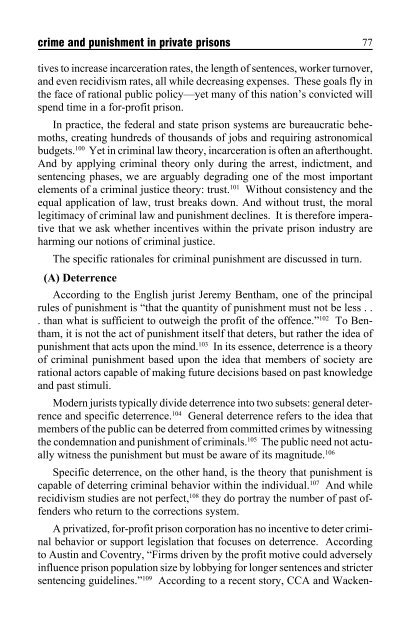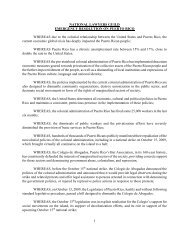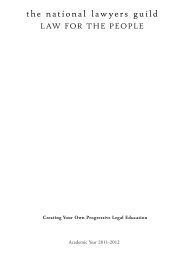Does your library have National Lawyers Guild Review?
Does your library have National Lawyers Guild Review?
Does your library have National Lawyers Guild Review?
You also want an ePaper? Increase the reach of your titles
YUMPU automatically turns print PDFs into web optimized ePapers that Google loves.
crime and punishment in private prisons77tives to increase incarceration rates, the length of sentences, worker turnover,and even recidivism rates, all while decreasing expenses. These goals fly inthe face of rational public policy—yet many of this nation’s convicted willspend time in a for-profit prison.In practice, the federal and state prison systems are bureaucratic behemoths,creating hundreds of thousands of jobs and requiring astronomicalbudgets. 100 Yet in criminal law theory, incarceration is often an afterthought.And by applying criminal theory only during the arrest, indictment, andsentencing phases, we are arguably degrading one of the most importantelements of a criminal justice theory: trust. 101 Without consistency and theequal application of law, trust breaks down. And without trust, the morallegitimacy of criminal law and punishment declines. It is therefore imperativethat we ask whether incentives within the private prison industry areharming our notions of criminal justice.The specific rationales for criminal punishment are discussed in turn.(A) DeterrenceAccording to the English jurist Jeremy Bentham, one of the principalrules of punishment is “that the quantity of punishment must not be less . .. than what is sufficient to outweigh the profit of the offence.” 102 To Bentham,it is not the act of punishment itself that deters, but rather the idea ofpunishment that acts upon the mind. 103 In its essence, deterrence is a theoryof criminal punishment based upon the idea that members of society arerational actors capable of making future decisions based on past knowledgeand past stimuli.Modern jurists typically divide deterrence into two subsets: general deterrenceand specific deterrence. 104 General deterrence refers to the idea thatmembers of the public can be deterred from committed crimes by witnessingthe condemnation and punishment of criminals. 105 The public need not actuallywitness the punishment but must be aware of its magnitude. 106Specific deterrence, on the other hand, is the theory that punishment iscapable of deterring criminal behavior within the individual. 107 And whilerecidivism studies are not perfect, 108 they do portray the number of past offenderswho return to the corrections system.A privatized, for-profit prison corporation has no incentive to deter criminalbehavior or support legislation that focuses on deterrence. Accordingto Austin and Coventry, “Firms driven by the profit motive could adverselyinfluence prison population size by lobbying for longer sentences and strictersentencing guidelines.” 109 According to a recent story, CCA and Wacken-












![NLGRev 68-2[1].indd - National Lawyers Guild](https://img.yumpu.com/30820772/1/167x260/nlgrev-68-21indd-national-lawyers-guild.jpg?quality=85)



